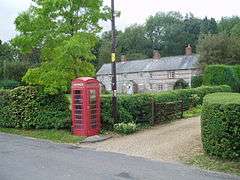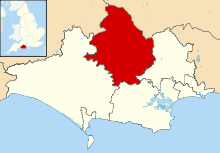Tarrant Gunville
| Tarrant Gunville | |
 Flint and brick cottages in Tarrant Gunville |
|
 Tarrant Gunville |
|
| Population | 233 |
|---|---|
| OS grid reference | ST926127 |
| District | North Dorset |
| Shire county | Dorset |
| Region | South West |
| Country | England |
| Sovereign state | United Kingdom |
| Post town | BLANDFORD FORUM |
| Postcode district | DT11 |
| Police | Dorset |
| Fire | Dorset and Wiltshire |
| Ambulance | South Western |
| EU Parliament | South West England |
| UK Parliament | North Dorset |
Coordinates: 50°54′53″N 2°06′26″W / 50.9148°N 2.1073°W
Tarrant Gunville is a village and civil parish in north Dorset, England, situated at the head of the Tarrant Valley on Cranborne Chase 5 miles (8.0 km) northeast of Blandford Forum. The parish covers 3,469 acres (1,404 ha) at an altitude of 70 to 170 metres (230 to 560 ft).[1][2] In the 2011 census the parish—which includes the settlement of Stubhampton to the north—had 119 dwellings,[3] 108 households and a population of 233.[4]
The parish has three round barrows and an unexcavated Iron Age enclosure with a 15' deep ditch, which Pevsner suspects was built in a hurry.
The medieval settlements in the parish were Stubhampton and Gunville. The parish church, dedicated to St Mary, is on the edge of Tarrant Gunville. It is on the site of an earlier building which probably dated from around 1100. The present building has a south porch, aisles and tower arch that are partly 14th-century, and a 15th-century west tower that was partly rebuilt in the 16th century, but the chancel and nave were rebuilt in 1843.[1] The architect of the rebuilding was Thomas Henry Wyatt.
Eastbury House, the surviving part of a much larger house designed by John Vanbrugh and built between 1717 and 1738, stands just east of Tarrant Gunville village. The larger part of the house was demolished in 1782. The grounds still display evidence of the original gardens, designed by Charles Bridgeman. It is probable that several of the ashlar and flint houses in the village were built using material taken from the demolished house. The photographer Thomas Wedgwood moved into the surviving part of Eastbury in 1800; his brother, the potter Josiah, had bought nearby Gunville House in 1799, shortly after its construction.[1]
The modern village hall was completed in 2001.
There are 23 structures in the parish that are listed by English Heritage for their special historical or architectural interest. These include Eastbury House (Grade I) and the parish church (Grade II*).[5]
References
- The Buildings of England by John Newman and Nikolaus Pevsner. Page 416. Published by Penguin Books 1972. Reprint 1975. ISBN 0-14-071044-2
- 1 2 3 "'Tarrant Gunville', in An Inventory of the Historical Monuments in Dorset, Volume 4, North (London, 1972), pp. 88-96". British History Online. University of London. Retrieved 7 February 2015.
- ↑ Ordnance Survey (2013), 1:25,000 Explorer series, sheet 118 (Shaftesbury & Cranborne Chase), ISBN 978-0-319-24123-3
- ↑ "Area: Tarrant Gunville (Parish). Dwellings, Household Spaces and Accommodation Type, 2011 (KS401EW)". Neighbourhood Statistics. Office for National Statistics. Retrieved 7 February 2015.
- ↑ "Area: Tarrant Gunville (Parish). Key Figures for 2011 Census: Key Statistics". Neighbourhood Statistics. Office for National Statistics. Retrieved 21 October 2013.
- ↑ "Listed Buildings in Tarrant Gunville, Dorset, England". British Listed Buildings. britishlistedbuildings.co.uk. Retrieved 23 February 2015.
External links
![]() Media related to Tarrant Gunville at Wikimedia Commons
Media related to Tarrant Gunville at Wikimedia Commons
